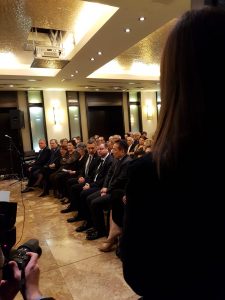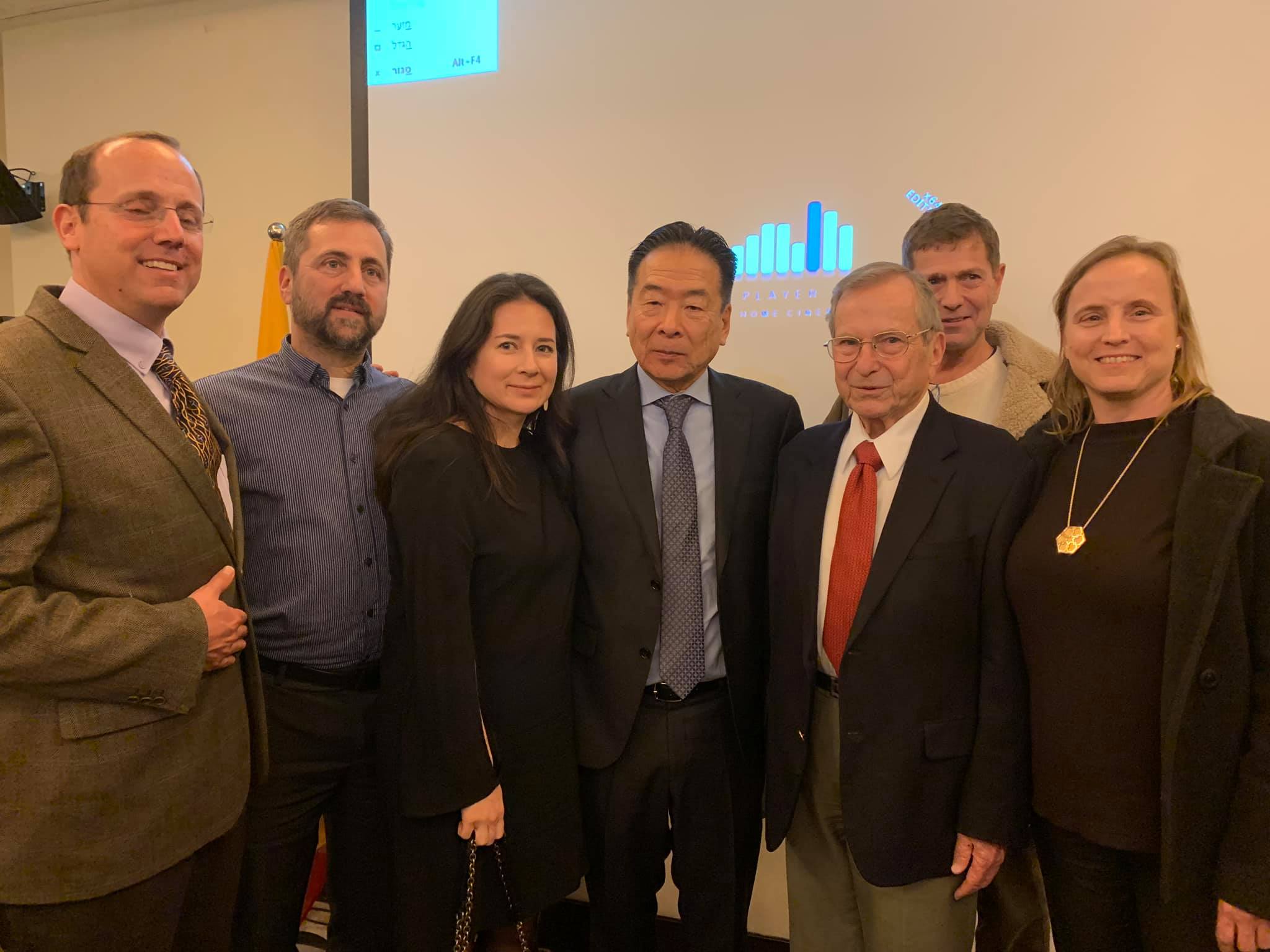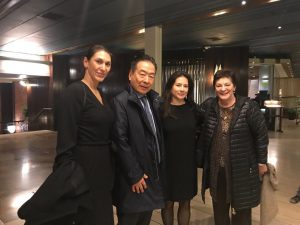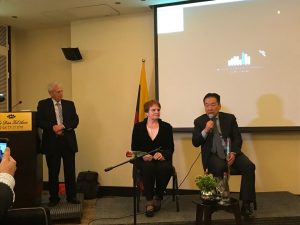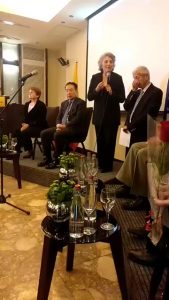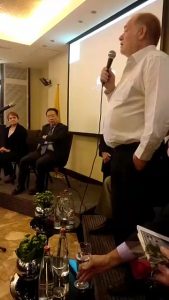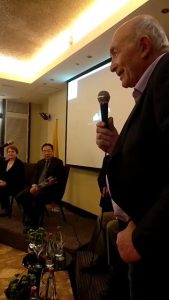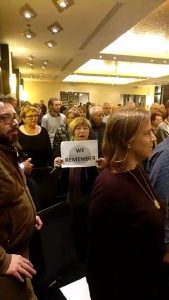A Tribute to the Righteous among the Nations 2019
On the 28th of January, 2019, International Holocaust Day, the Association held a memorial service in tribute to the Righteous among the Nations, families of the survivors and the extended families of the saviors and the survivors. The guests of honor were the son of the Japanese consul, Chiyona Sugihara, who was in Kovno during the war and saved the lives of thousands of Jews and the granddaughter of Sofija Binkiene from Kovno, who hid entire Jewish families in her home at great personal risk. Survivors and their families were also invited and were moved to meet the families of the saviors and told the audience stories of their rescue.
As always, the naval unit adopted by the Association came in uniform and added a special touch to the event.
The testimony of Sergei Korablikov
My father Makar and my mother Batya Kovarski met in Vilna before the war. My father was not Jewish so my mother's family banned her from meeting him. He married Bluma Trotsky, a friend of my mother's and they had a son. The war had already started and Bluma and her son, Elia, hid at her mother-in-law's (later my grandmother) home. One day the Germans began an Akztion against the Jews in the area and led them into the forest to execute them. Bluma looked out the window and saw her parents being taken and, unable to withstand the pain, handed her son over to her mother-in-law and joined her parents, never to return. During that difficult period, my parents fell in love and that is how I came into the world. I was born in the Vilna Ghetto in 1942. Shortly before I was born, there were orders from the German High Command that it was forbidden to give birth in the ghetto, but my mother risked her life and gave birth secretly in the attic of the Jewish hospital; I stayed hidden there for a few months while my mother went out to work, returning every few hours to nurse me. My father was a Russian gentile so he did not live in the ghetto. He was a partisan in an anti-Fascist movement, wanted by the German authorities and was in hiding all that time. He would wear the yellow badge, come into the ghetto to visit us and acted as a contact person between us and the outside world. Had the Nazis discovered that my mother gave birth to me in the ghetto we would both have been executed, so they had to smuggle me out of the ghetto.
When I was a few months old my parents, together with helpers from the ghetto, smuggled me out. In the middle of the night they tied a basket to a long piece of rope and lowered me to the ground from the top floor. It was very dangerous and had they been discovered, they would all have been executed. I was hidden at the home of my aunt, Fetinia Korakblikov Chernitzov, who registered me as her own son. In order not to arouse suspicion she married a friend (Pavel Chernitzov), who agreed to cooperate with her and she dressed up as a pregnant woman so that they looked like a married couple with their newborn son. My father smuggled my mother out of the ghetto and she joined the partisans. They fought the Nazis for a few months until my mother fell in 1943 in the battle by Lake Narocz and my father was caught by the Gestapo, tortured and then executed. In the meantime I grew up with my aunt, grandmother and half-brother and knew nothing about my parents. It was a very dangerous time and we had to be careful to make no mistakes. The neighbors were suspicious and, every so often, they would "inform" the authorities that Jews were being hidden in the neighborhood.
We had a 15-year old neighbor called George who would always run to our house to let us know when he heard policemen approaching. When I was about one, he was caught before he managed to reach us. The police found his radio (at that time it was forbidden to have any communication device so that we would not know what was happening) and beat him so severely that he was left crippled. My grandmother only heard the police when they were at the front door and, immediately, she threw me out the window into the potato patch behind the house. It was a miracle that we were saved and they did not find me. We lived in constant danger. My aunt and grandmother were declared Righteous among the Nations since they were not Jewish but had risked their lives to save me.
I lived with my aunt as a Russian with a false identity until I was 10, when she died of leukemia. The war was over but I knew nothing of my true origins. Over the years Jewish aunts from my mother's side would come and visit but we lived outside the city and I did not understand the meaning of the word "Jew" nor did I ask myself why their surname was different from mine. (My surname was the same as my father's, Korablikov.) After my "second mother" died, my grandmother told me the story of my life but I did not really understand. There was nobody left to bring up my half-brother and me so we were enrolled in a military academy for the sons of fighters and well-known figures (my father was a fighter and a famous partisan). When I was 14, a friend of my mother's came to visit me and brought me a picture of my mother and that was the first time I saw my mother. At the time I had seen several movies about the Holocaust and identified strongly with my Jewish side, so it was important for me to regain my Jewish identity, which I did.
When I finished the military academy, at the age of 20, I decided not to go into the army but to study medicine. I felt I had to do something serious and worthwhile, something connected to saving lives. Medical school was in Leningrad where I met my wife and got married. We returned to Lithuania where I worked as a doctor in the General Hospital where I advanced to the position of deputy head of the hospital and the medical representative in the Lithuanian government.
At a certain stage I felt I needed a change and I requested a transfer to a position abroad; I was transferred to Yemen where I worked for three years. The climate was so different from Lithuania: in the winter, the "lowest" temperature was 24°C and in the summer it would reach 55°C. In 1982, while I was still there, many wounded Palestinians came from Lebanon. At the hospital they did not know that I was Jewish because of my (father's) surname. One day, one of the wounded Palestinians grasped me by the throat and said: "What's a Jew doing here?" I couldn't understand how he knew I was Jewish. He must have sensed I was Jewish. Of course, the staff rushed to my assistance but I had to inform the embassy; when I did so, they told me I was in great danger in Yemen and terminated my contract and I returned to Vilna. In 1989 there was a conference of Jewish doctors in Lithuania and I received an invitation to visit Israel. I arrived for a visit and discovered many members of my family living there. I felt a strong attachment to the country. When I was at Kibbutz Ma'abarot, for example, I saw a well-known archaeologist washing his tools in the kitchen sink together with the regular cutlery, as thought they were everyday spoons. Something attracted me, the simplicity of life and Israeli democracy; when I visited the Western Wall, I realized that I wanted to make aliyah. When I returned to Vilna, I told my wife and children and we decided that before taking such a serious step, we would take a break to think things over. I asked for another transfer and this time I was sent to India. My two children, Vladimir and Tammuz, were already born by this time. Tammuz was only a few months old so he and my wife came to India with me and Vladimir stayed in Vilna to study. A few months later, he asked us to return. He did not want to remain in Lithuania and I understood that the time was ripe for the move.
We made aliyah in 1991 and I still work in the kibbutzim in the Jordan Valley area and the Italian Hospital in Nazareth. I write poems in Russian and I have already published three books of poetry; I am a registered member of the Russian association of writers. Ten years ago I put in a request to renew my Lithuanian citizenship. I would like to leave an imprint on history, to preserve the connection between the Lithuanians and the Jews. It is important that the young Lithuanians recognize the Jews and not permit the Nazi atmosphere to permeate their country again: an event like the Holocaust must never recur.

